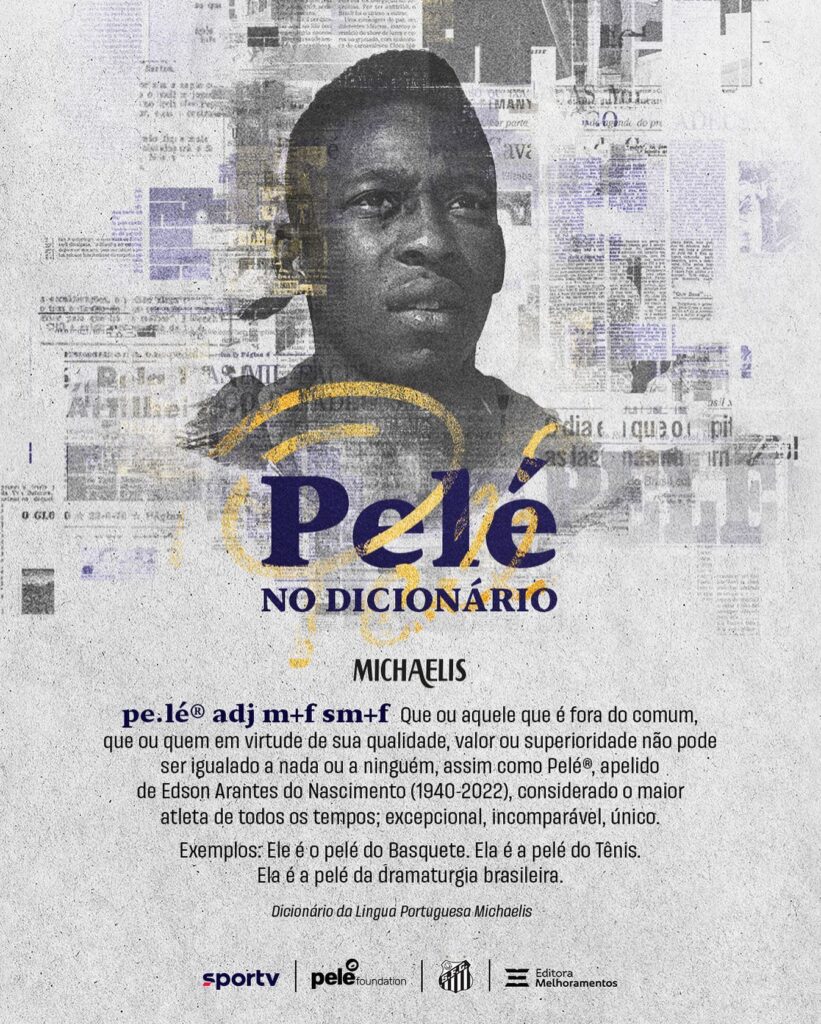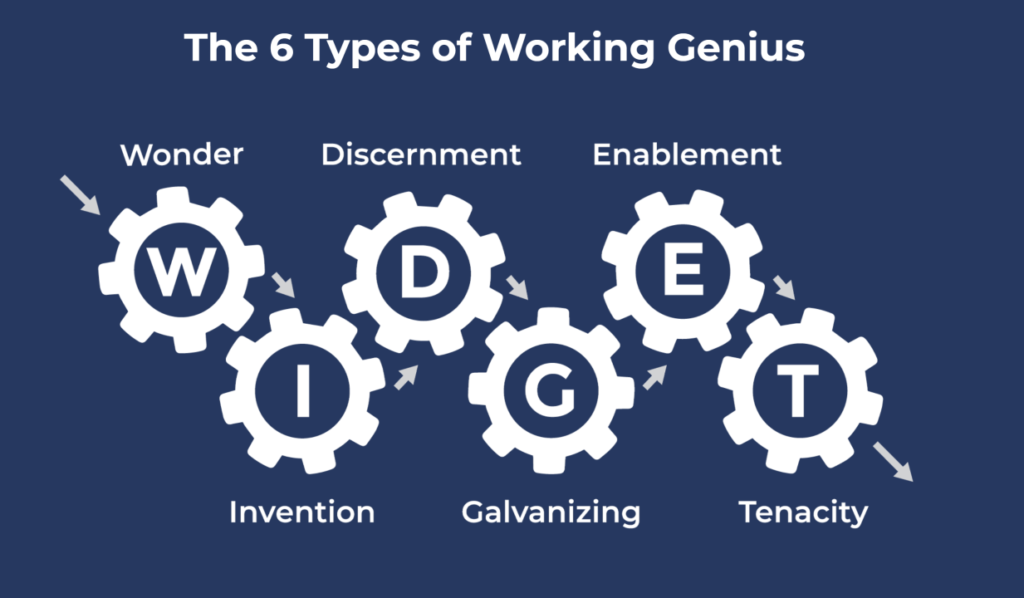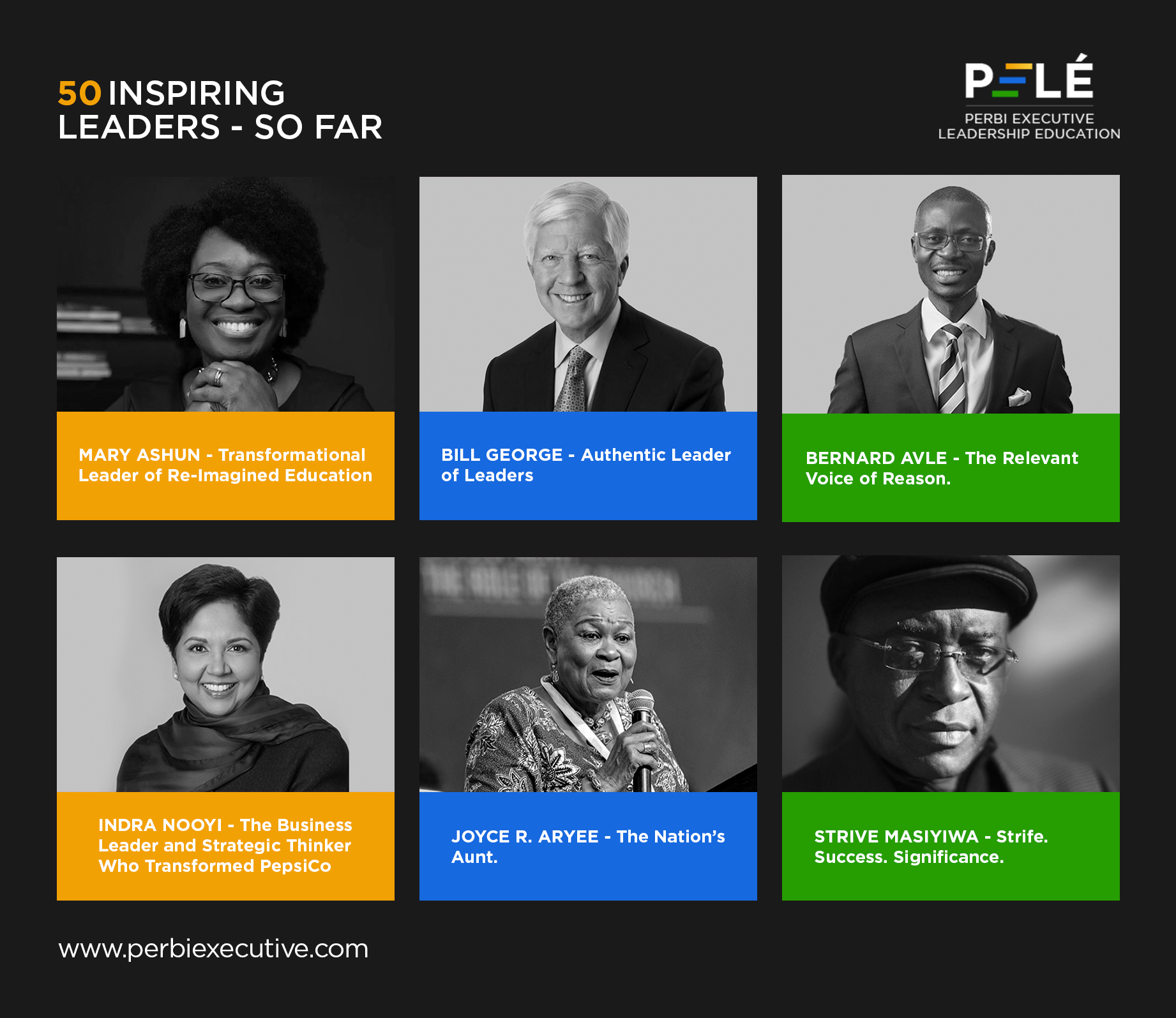
50 Inspiring Living Leaders
Dear Leader,
If you haven’t yet checked out the first 10% of the 50 Inspiring Living Leaders on the Perbi Executive Leadership Education (PELÉ) website, catch up quickly and get some oxygen for you leadership journey:
1. STRIVE MASIYIWA—Strife. Success. Significance: https://perbiexecutive.com/strife-success-significance…/
2. JOYCE ARYEE—A Nation’s Aunt: https://perbiexecutive.com/a-nations-aunt-joyce-r-aryee/
3. INDRA NOOYI—The Business Leader and Strategic Thinker Who Transformed PepsiCo: https://perbiexecutive.com/indra-nooyi-the-business…/
4. BERNARD AVLE—The Relevant Voice of Reason: https://perbiexecutive.com/bernard-avle-the-relevant…/
5. BILL GEORGE—Authentic Leader of Leaders: https://perbiexecutive.com/bill-george-authentic-leader…/
6. MARY ASHUN—Transformational Leader of Re-Imagined Education: https://perbiexecutive.com/mary-ashun-transformational…/
This 50 Inspiring Living Leaders series highlights current influencers who are succeeding in leadership, integrity, family or entrepreneurship in whatever field and exhibit most, if not all, of our values of PELÉ. We value people, growth, particularity, excellence, success, authenticity and significance. These stories are largely written in terms of growth, success and significance in leadership, integrity, family and entrepreneurship. While we do our best to receive personal references about each leader, most of our research and writing is based on literature review of publicly-available information. As authorities in leadership, we are fully aware that there is no such thing as a perfect leader, and leaders may have their flaws, but we choose to celebrate these inspiring living leaders for their achievements outlined in our series. Having said that, should you happen to have any incontrovertible evidence that any of our featured leaders does not fit our bill of an authentic leader, please write to us at info@perbiexecutive.com. Our vision at PELÉ is a flourishing global ecosystem of authentic leaders characterised by healthy growth, holistic success and lasting significance.
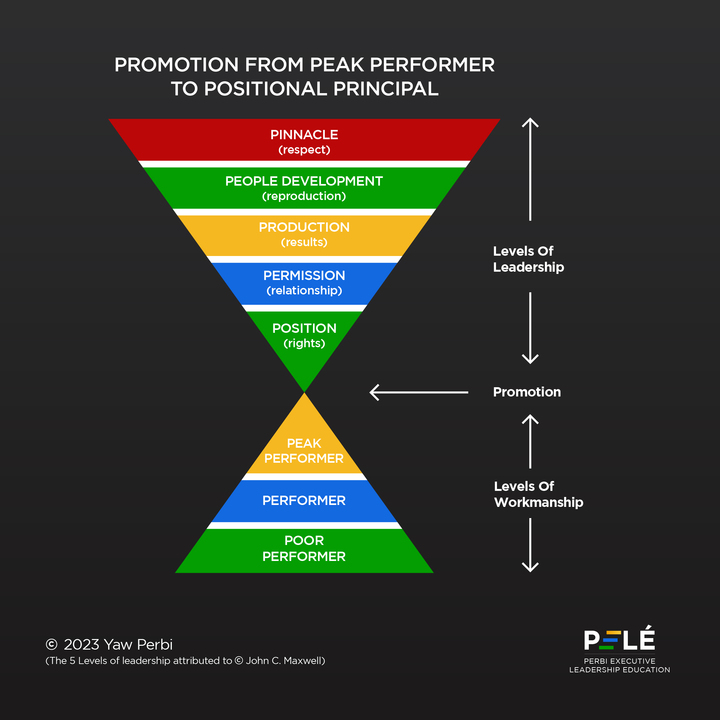
The Best Promotions are the Worst.
Here’s the worst thing about the best promotion. At one of my organizations, we recently had to let an excellent hire go. Come to think of it, we failed him. We failed him by promoting him.
You would think that all promotions are good but no. One of the worst kinds is being ‘elevated’ to become a leader just because you are an outstanding worker or producer. Working on stuff and excelling is very different from working with souls to excel. The reward for hard work is more work, weird yes, but the latter tends to be more mental work than manual —which most people find as more beneficial—also, more of working with people than working on things.
As one person shared about struggling with leadership upon her first promotion as a telco manager: “Within one month, I went from being the best programmer to the worst supervisor.” I’ve seen this happen to too many people in too many places. I grew up on the University of Ghana campus (both my grandfather and mother were professors there) and I would see time and time again fine lecturers promoted into leadership positions, from heads of department through deanship to vice-chancellorship and flail and fail. How many times have I said that a great chemist or erudite historian doesn’t necessarily make a great leader!
We do the same in the medical world, promoting top surgeons to head departments or if God doesn’t intervene, to head the hospital! When I was promoted to supervise the Military Polyclinic at the 37 Military Hospital in Accra, determining the doctors scheduling and all, in my opinion it was only because I wasn’t a bad doctor and had been around long enough. And no one gave me a minute’s training about leadership. Squat. Thank God I had been a private student of leadership for years prior.
It doesn’t start out as a bad thing; in fact, it is exhilarating at first for the recipient of the promotion. And the giver of the opportunity ordinarily also means well and feels good about it. But organizational leaders need to rethink the notion of making people supervisors, managers or leaders as a reward for diligent or even skillful individual technical work. It can backfire, seriously.
A STORY I CAN’T GET OVER
One of the most poignant illustrations of this phenomenon of worker/rewarded-as-leader is told by my mentor Bill George in his book ‘True North.’ It’s about the person who confessed upon her first promotion as a telco manager, “Within one month, I went from being the best programmer to the worst supervisor.” Here are some more details:
“It’s unbelievable how bad I was. I didn’t know how to delegate. When somebody had a question about their work, I’d pick it up and do it. My group was not accomplishing anything because I was on the critical path of everything. My boss saw we were imploding, so he did an amazing thing: He gave me every new project that came in. It was unreal. At 4:30 PM, my team would leave, and I’d be working day and night trying to dig through this stuff.
“Finally, I couldn’t take it any longer. I went to his office, stamped my foot like a 5-year-old, and said, “It’s not fair. I have the work of 10 people!” He sad calmly, “Look out there. You have 10 people. Put them to work.” It was such a startling revelation. I said sheepishly, “I get it.”” [1]
If this person hadn’t eventually learned to lead people, she would never have made it to becoming president and CEO of the American Red Cross on June 23, 2008. Prior to that she had also held top management positions at AT&T Corporation and Fidelity Investments. She is a member of the board of trustees of Johns Hopkins University and the board of directors of DTE Energy.
This is Gail J. McGovern we’re talking about here, even recognized by Fortune magazine in 2000 and 2001 as one of the top 50 most powerful women in corporate America. Alas, not all of such stories that begin with such ‘good promotions’ end well, and even when they do, not without significant damage to many.
DIAGNOSIS OF LEADERSHIP FAILURE POST PROMOTION
It takes both a different mindset and skill set to move from being an excellent worker to being a good leader, let alone a great one. Yet we come to the world of work with both a mindset and skillset that ill-prepare us for leadership success. Even prior, we are socialized largely to excel as individuals. I concur with Bill George that this unpreparedness is attributable to our upbringing:
“…so much of our early success in life depends upon individual efforts, from the grades we earn in school to our performance in individual sports to our initial work assignments. Admissions offices and employers closely examine those achievements and use them to make comparisons. …As we are promoted from individual roles to leadership, we believe we are being recognized for our ability to get others to follow us…
“To become authentic leaders, we must discard the myth that leadership means having legions of supporters following us as we ascend to the pinnacles of power. Only then can we realize that authentic leadership is serving people… How else can they unleash the power of their organization unless they motivate people to reach their full potential? … Only when leaders stop focusing on their personal needs and see themselves as serving others are they able to develop other leaders.” [2]
ROAD MAP TO LEADERSHIP SUCCESS POST PROMOTION
If Maxwell’s 5 Levels of Leadership is anything to go by, then when one is promoted from the top echelons of the worker floor (Peak Performer/Worker Level 3 in diagram above), they only end up at Level 1 of leadership: Position. The lowest level of leadership—the entry level, if you will—is position. People only follow if they believe that they have to (otherwise you might use your powers of carrot and stick). If this leader takes the hint and invests in their leadership growth, they can move to Leader Level 2—Permission—which is based on relationship. At this level, people choose to follow because they want to.
You will notice that even what Gail was trying to get done at work, putting the 10 people ‘out there’ to work, is still only mid-level in the Maxwell scheme of things: Production. Good leaders know how to motivate their people to GTD – get things done! And getting things done is what Leader Level 3 is all about. But they’re only good; not great. Leader Level 4 — People Development—can be summed up in another word: Reproduction. One’s goal at this level is to identify and develop as many leaders as one can and investing in them to help them grow. Here (Leader Level 4), you’re producing people as leaders, not producing work through people (Leader Level 3).
The most challenging and highest level of leadership, Level 5, is the Pinnacle. According to Maxwell, it requires longevity as well as intentionality in investing one’s life into the lives of other leaders and organizations for the long haul (while growing yourself as lifelong learner all the while). People follow such because of who they are and what they represent. Their leadership gains a positive reputation, betters still, one has earned respect.
Note that Level 5 leaders develop Level 5 organizations. I will add that in the leader versUs institutions debate—as to whether it is strong leaders or strong institutions we need to develop long-term—I would say that it takes Level 5 leaders to build the structures and systems that produce strong institutions. This is the realm of legacy. As a result, Level 5 leaders often transcend their position, their organization, their industry and perhaps even their nation.
And nothing accelerates leaders through these levels, from 1 to 5, like intentional coaching.
CONCLUSION
As you can tell already, it’s a long way from being the best worker to being a great leader. There is nothing more painful than a “highly capable individual” (as Jim Collins puts it) thinking that just because they’ve been a peak performer and ‘made it’ onto the supervision, management or leadership floor that they’ve got what it takes to run the ship. One’s productive contribution through individual effort in knowledge, skills and good work habits won’t cut it. As promoters, if we promote people and fail to plan a leadership growth path alongside that, we’ve inadvertently planned to fail them.
Congratulations on your promotion, but to ensure that dream-come-true doesn’t become a nightmare, and the reward a trap instead, you must be aware that it’s a floor and not the ceiling. Top floor workers’ triumphal entry through the golden portal of promotion only lands you as a ground floor leader. Welcome to Level 1 of Leadership: position. Just that.
References
[1] Bill George. True North: Becoming an Authentic Leader. Second edition; expanded and updated edition. Jossey-Bass, Hoboken, NJ, 2015, pg. 186-187.
[2] Ibid, pg. 185
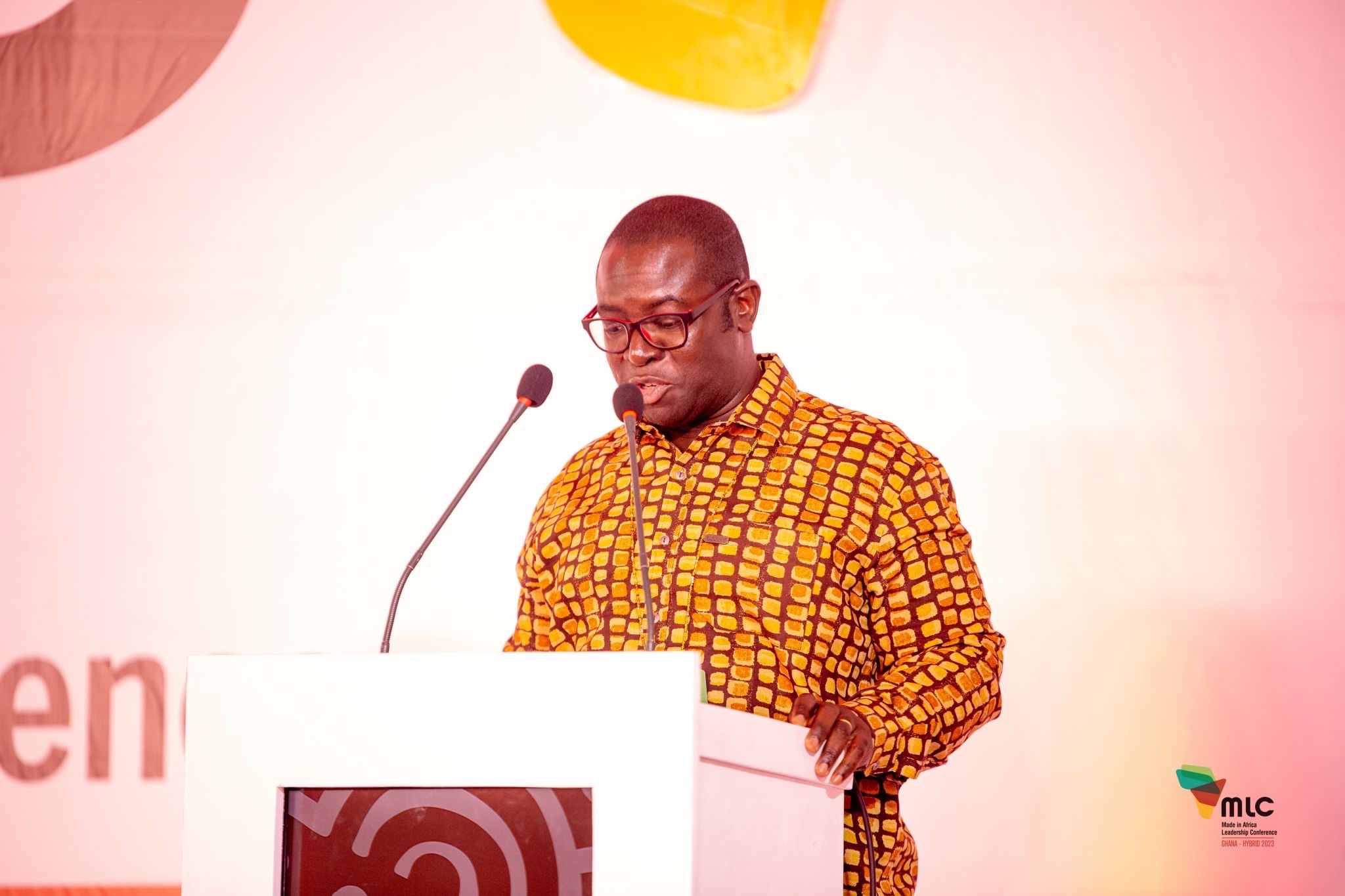
Sans Leadership–So Much to Lose, Too Much to Lose.
The following was shared as a TED-like talk to open the Made in Africa Leadership Conference by BCA Leadership on June 14 at the Marriot Hotel, Accra, Ghana.
My uncle died. My mom’s youngest brother. He came over to Ghana from the United States, where he had lived for decades, and fell ill. He died in the very hospital I worked in at the time. In fact, he died on my ward. But I can swear it wasn’t his disease that killed him. It was leadership, or rather the lack thereof. Leadership is too important for doctors not to have it.
Some of the most important things in life are not taught in school, like leadership. When some of my friends from university got into government I did exhort them: “Nobody taught us Jack about leadership. LEARN LEADERSHIP! CONTRACT COACHES! Leadership is not just caught; it is taught.” Did they listen? Ha!
Ironically, communal, national, continental or even global leadership, is a deeply person-al thing. It takes deeply transformed leaders to deeply transform society. Authentic leadership begins with aligning what goes on in a leader’s head and heart with True North. Leadership principles or True North are no respector of persons—red or yellow, black or white.
Two days from now, we will be officially launching the 20th anniversary celebration of The HuD Group, a holistic leadership organization started by nine young Africans in Accra. From one country in West Africa, it now has presence in 24 countries, on all six continents. Out of Africa to the Rest. From a former Rwandan refugee now in executive leadership in Uganda to a former child soldier in Sierra Leone now a high-ranking bank official in his homeland, to a Chinese-Canadian who we trained via Skype when she was an international medical student in Australia, a lot of transformation and impact has been achieved but in Ghana in particular I feel much of our gains have been eroded by not giving adequate attention to political leadership.
So today is the first of two important occasions this week where I will be drumming home this point with all my heart, liver, spleen and intestines: “Leadership is too important to leave it to politicians alone.” AND with 90% of African businesses being SMEs, creating 60-80% of our jobs and accounting for 40% of our GDP, what we do here at MLC this week for African leaders and African leadership is wildly important.
When two 14-year old stowaways from Guinea, Yaguine and Foday, froze to death in the landing gear of an Airbus 330 from Conakry to Brussels, they had on them a hand-written letter labelled: IN CASE WE DIE… to the Messrs. members and officials of Europe.
They said, among other things, “We have the honor and pleasure and great confidence in you to write this letter … we appeal to your solidarity and kindness for help in Africa. …we, African children and youth, ask you to create a great, efficient organization for Africa to allow us to progress. …we want to study and we ask you to help us in Africa to study to be like you.”
You should find and read the whole letter here—it will thaw and tear your heart. And that was 24 years ago. Has anything changed?
It’s time for Leadership Made in Africa that makes Africa work for Africans. BEFORE WE DIE. Yes we can, partnering and collaborating to reimagine and reform the Africa that we want! Twende! Let’s go! Let’s do this!
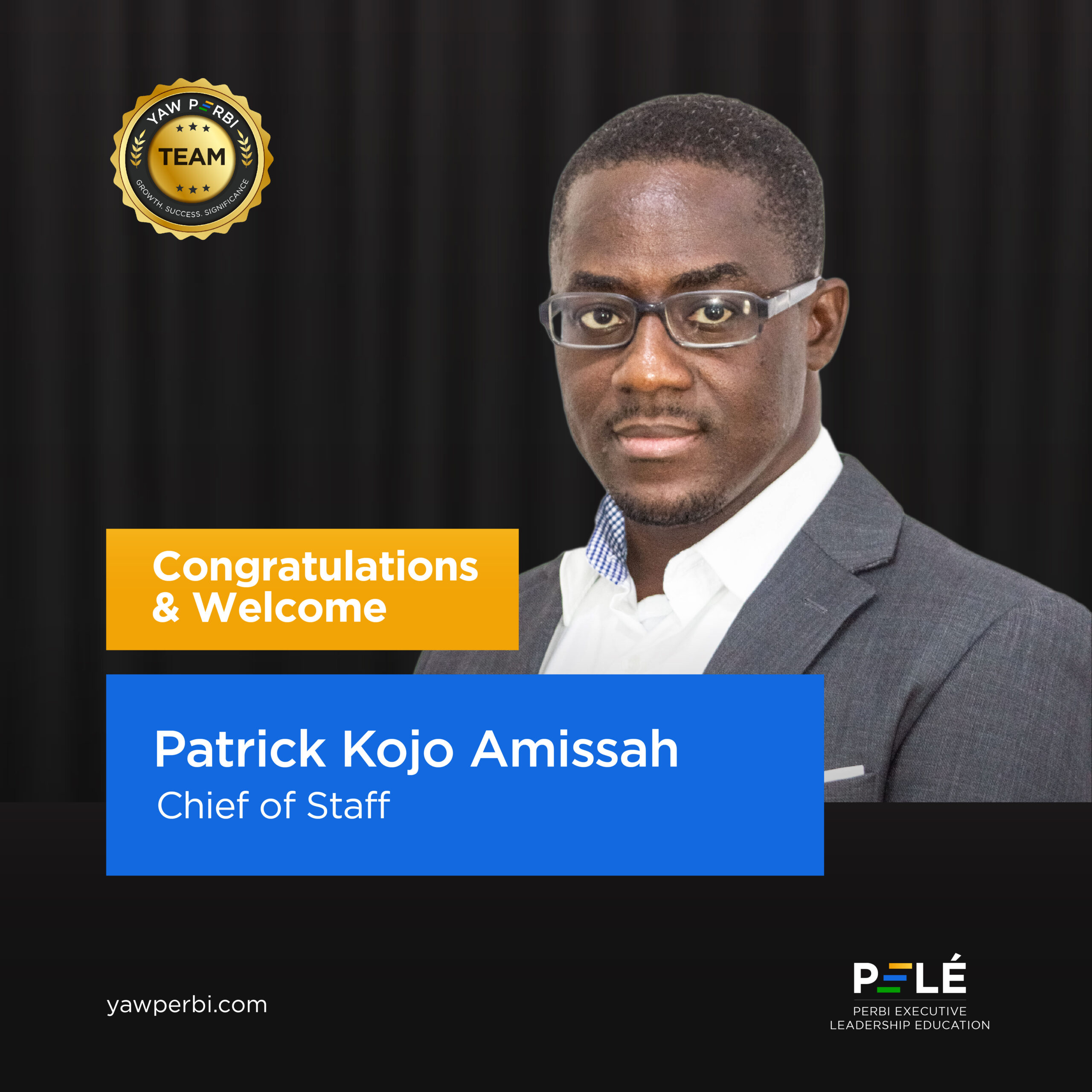
Perbi Executive Leadership Education (PELÉ) Gets New Chief of Staff: Introducing Patrick Kojo Amissah.
Perbi Executive Leadership Education (PELÉ) and allied Perbi establishments heartily welcome Mr. Patrick Kojo Amissah as our new Chief of Staff. Kojo Amissah is a versatile professional with experience in organisational leadership, team and operations management. He believes in striving for excellence and critically analysing problems with the goal of coming up with practicable, innovative solutions. He has worked in the educational, publishing and financial sectors.
Kojo’s previous work experience includes co-managing a start-up (Catalyst Learning Limited) and growing it into a sustainable firm. His responsibilities included structuring and establishing different roles and tasks, recruiting and training staff, establishing systems, managing finances, and planning and executing projects. For over three years he led in the development, printing and distribution of over five million copies of textbooks and workbooks to various schools across Ghana. He managed communications and relations with foreign printing firms including negotiating prices and planning the delivery of printed books.
We are convinced that the skills and knowledge gained from these experiences will enable him to quickly adapt to the demands of the Chief of Staff role at PELÉ and to exceptionally perform the outlined responsibilities. Mr. Amissah possesses good leadership and team management skills which he honed while serving as Team Leader, Curriculum Development and as Chief Operations Officer. Watch out for PELÉ’s online leadership courses to be launched by mid 2023.
Mr. Amissah developed important team building and conflict management strategies as he directly and indirectly managed over thirty individuals performing different roles. He also possesses good negotiation skills and valuable stakeholder management experience. At PELÉ, we believe these are important transferable skills that will aid his interactions with staff of Perbi Executive Leadership Education and affiliated organisations like Perbi Cubs, Kwiverr, The HuD Group, Send Africa, Adeshe Real Estate, ISMCanada, PAIS, Africa to the Rest, BCA Leadership, the Lausanne Movement etc. Kojo takes the baton from Ashesi cum University of Warwick alumna Araba Andoh who laid pioneering tracks for the role.
According to Kojo, “I am highly motivated to serve in the role because it provides the opportunity for me to put my unique mix of experience in leadership, operations management and publishing to use in the worthy cause of growing executives to make significant impact in society. I also believe that working directly with an accomplished leader and entrepreneur like Dr. Yaw Perbi is an unmissable opportunity to grow professionally.” Among Kojo’s first tasks will be helping to host the incoming BCA Leadership Made in Africa Leadership Conference, launching PELÉ’s avant-garde DeepLEAD online leadership course and providing operational support for both The HuD Group’s 20th anniversary activities and Kanéval by PerbiCubs/UNESCO Accra World Book Capital. In commemoration of the latter, Dr. Yaw Perbi seeks to (re)publish all his two dozen books.
We welcome Mr. Kojo Amissah at this inflexion point where YAW PERBI is transitioning to PELÉ (Perbi Executive Leadership Education) to maximize team potentials beyond the availability and capability of Dr. Yaw Perbi as an individual. PELÉ by YAW PERBI is an Executive Education firm that offers authentic and customized relationships and resources to C-Level executives to grow personally, succeed professionally and become significant societally. PELÉ’s vision is to see a flourishing global ecosystem of authentic leaders characterized by growth, success and significance.
Kojo wields a Bachelor’s degree from the University of Ghana and an MBA from Coventry University. He is a practising catholic. Akwaaba, Kojo. Bienvenue, Monsieur Amissah. Here’s to your own growth, success and significance. Together, let’s carpe diem and make a dent in the universe!

Introducing PELÉ (Perbi Executive Leadership Education).
Imagine a flourishing global ecosystem of authentic leaders characterized by healthy growth, holistic success and lasting significance. That’s the big dream and eternal hope fuelling our daily tasks at the Executive Education firm that bears my name, YAW PERBI. A couple of years ago, after eight years as President & CEO of a Canadian non-profit in the international education space and having garnered several years of executive leadership experience in the Ghanaian military and medical fraternity, global media, the United Nations in Cote d’Ivoire etc. I decided it was time to serve all of that to leaders of leaders: the C-suite. So I came out of sabbatical and stepped down as President of ISMCanada to do this.
Since according to my mentor of a quarter of a century, John C. Maxwell, by whom I’m officially a certified coach, speaker and trainer, that “one is too small a number to achieve greatness,” I have been steadily growing a global team of competent, caring, confident and character-based co-leaders on/from every continent in the world beyond myself to make our faith, sight. That journey has culminated in the birth of PELÉ.
A Play on Words
In keeping our focus on growing and coaching executive leadership to succeed, ever broadening the authentic relationships and resources we bring to bear on our task, we decided to move away from YAW PERBI specifically and to build Perbi Executive Leadership Education, PELÉ for short. PELÉ is not exactly just a happy coincidence, for as a once-upon-a-time football fanatic and soccer player for my elementary school, I recently engaged in my fair share of arguments about who the greatest soccer player of all time is between the shouts in favour of Lionel Messi after lifting the Qatar World Cup trophy on December 18, 2022 and the incessant calls to hallow the legendary Edson Arantes do Nascimento, better known by his nickname Pelé, who died eleven days later on December 29. As a double childhood hero—both of my dad and myself—I had been pondering a way to honour a Black man who gave everyone so much delight and so many people of his skin hue so much pride.
As I’ve stated before, “I am eager to particularly provide C-level executives of African descent with the paradigms, processes and tools necessary to maximize their potential, to be world class, take the world stage and make their dent in the universe.”
A Word In Play
Then came April 2023 when the Pelé Foundation and Sportv launched the “Pelé in the dictionary” campaign to pay tribute and recognise his legacy in other fields beyond sport. Of course his name has long been a synonymous with success and excellence, both of which are values of our Executive Education company, but now the great Brazilian forward and only human to have lifted three World Cup trophies officially had his name in the Portuguese dictionary. The adjective “Pelé” has been added to the Portuguese edition of the Michaelis dictionary to describe “someone out of the ordinary.”
Pelé, the nickname of the late football legend, has officially become tantamount to “extraordinary, exceptional, incomparable, unique.” Pelé is an adjective for something or someone that is out of the ordinary, one who by virtue of their quality, value or superiority cannot be equalled to anything or anyone, just like Pelé. For example, he is the Pelé of basketball, she is the Pelé of paediatrics.
What’s in a Name?
According to Emily Olson of NPR, “It was in the small, impoverished town of Bauru where he first got his nickname playing in youth leagues.” Apparently, even Pelé himself wasn’t sure where it came from, he wrote in a 2006 piece for The Guardian, but it may have been a play on Bilé, the nickname of a goalkeeper for the team Pelé’s father played on. “I can remember the name really bugged me at first. I was really proud that I was named after Thomas Edison and wanted to be called Edson,” he said. “I thought Pelé sounded horrible. It was a rubbish name. Edson sounded so much more serious and important.”
PELÉ by YAW PERBI is an Executive Education firm that offers authentic and customized relationships and resources to C-Level executives to grow personally, succeed professionally and become significant societally. To this end, the company provides Pelé services in leadership development, management training, executive coaching and publishing. Our Pelé coaching, authoring, speaking, and training are centred on LIFE—Leadership, Integrity, Family, Entrepreneurship.
Conclusion
We are PELÉ–extraordinary, exceptional, incomparable, unique–but more importantly, we form PELÉs, who are authentic, out of the ordinary executive leaders in every sector of life and all society’s centres of influence. As a forward-looking, authentic leader, if you want to dextrously dribble through LIFE and exceptionally hit goals like the legendary Pelé, you know where to look for the kind of coaching and training it will take: Perbi Executive Leadership Education (PELÉ). Like begets like.

Competence is Character.
Photo credit: Jethro and Moses, watercolor circa 1900 by Jacques Joseph Tissot (1836–1902), courtesy of Wikimedia.
While a lot of #leadership thinking is that leadership comprises #competence AND #character, for others like Jethro of Midian, competence IS character. Discuss.
For the Eager Beaver:
“Listen now to me,” Jethro advised Moses his son-in-law regarding leadership delegation, “Select capable men from all the people–men who fear [revere] God, trustworthy men who hate dishonest gain–and appoint them as officials over thousands, hundreds, fifties and tens” (Exodus 18). Jethro, also known as Reuel, was a Kenite shepherd and priest of Midian.

The Fathers’ Appetites Have Soured the Children’s Futures
The following slightly edited version of this article was first written and posted on Dr. Yaw Perbi’s FaceBook wall on January 31, 2023. At the time, that last day of January was the deadline to tender in eligible Government of Ghana bonds in the controversial Domestic Debt Exchange (DDE). There have been scores of passionate responses to the trending article that we have decided to reproduce it here so people are able to document these for posterity.
I am pained that, ‘The fathers have eaten sour grapes, and the children’s teeth are set on edge’ (Ezekiel 18:2). For over 20 years now, The HuD Group and I have championed a culture of savings and investments in Ghana, and had the JOY of seeing thousands heeding the call, especially young people. Financial Whizzdom, is what we called the campaign.
I wrote three personal finance books and executed a triple launch of Financial Whizzdom, Financial Whizzdom Nuggets (a summary) and Financial Whizzdom through Investment Clubs. It was around that time that Uncle Ken became a mentor to me. He was intrigued that a medical student would be so adept at the world of finance. He not only loaned us some money to finish the project (which we fully paid back within three months or so) but he also passionately spoke at the triple launch. The year was 2004.
Many like-minded people came together to push a savings and investments culture among young people. We traveled the length and breadth of Ghana, doing several seminars and workshops. Medics Investment Club (which really is the first investment club in Ghana per the National Association of Investment Clubs definition) became a model for many who also started their own investment clubs around the country, from university campuses and nursing training colleges to even secondary schools. No wonder I’ve been christened “the grandfather of investment clubs in Ghana.”
The many who wanted to join our investment club at the University of Ghana Medical School but who couldn’t (we had set the maximum for 20) were mobilized into a collective investment scheme we called ‘Mutual Medics.’ At the peak we grew to about 300. We sacrificed student loans, ice cream money and even extra-curricular fun and entertainment to save for our future. Almost none of us have withdrawn the monies we invested almost two decades ago.
Today, January 31, 2023, is the deadline for the trustees of this mutual investment scheme we set up way back in our medical school days to inform Databank for sure whether or not to tender in our eligible bonds in the Government of Ghana’s Domestic Debt Exchange (DDE) debacle. Our fund managers had 70% of the total value of the fund in government bonds, which in normal times and normal places with normal people are supposed to be very low risk, even tempting some advisors to say ‘no risk’ (nothing is ‘no risk,’ not even life itself!).
This DDE is supposed to be a voluntary move but in reality it is a case of “choose your poison.” If you drink this one you will die, if you drink the other one, you will surely die. I am pained for myself, colleagues, fund managers, and the whole investment fraternity in Ghana, especially the younger generation. How did we get here? Indeed, ‘The fathers have eaten sour grapes, and the children’s teeth are set on edge.’
Even more heart-wrenching is that if this should happen under any Finance Minister’s regime, not under the watch of the very mentor who, as far as I know, has spent his whole life building the very financial culture, structures and systems that seem to be now crumbling at his hitherto dextrous hands. The irony.
I am pained. Very much. Whoever has eaten our money, killed our dreams, buried our hope and compelled us to come for unfashionable haircuts that make us look like our misery will have to make it up to us, somehow, even if it is their children or their children’s children. In the mean time, ‘The fathers have eaten sour grapes, and the children’s teeth are set on edge.’ Ah!
~By Dr. Yaw Perbi
Photo credit: Opinion Nigeria
Post Script
We shall do well to document as many of the responses we’ve garnered so far as possible. This issue warrants a national conversation, at the least. A national demonstration for all those equally pained might also be in order to send a strong message to the current government, who in spite of all the pain they are inflicting on the citizenry, have shown no significant sense of regret, repentance or even austerity.

On Saving a Nation.
The story is told of a man who traveled from a developing country to a more economically advanced one in search of a better life. Upon arrival, the man was shocked to find that no one managed the local milk shop. Customers would take what they needed from the refrigerator, leave the exact amount of money for their purchase, and be on their way. Neither the milk nor the money was under lock and key. This would never happen in my country, he thought.
The only thing that surprised the man more than the honor system of the unmanned milk dispensary was the price of the product. The milk was cheaper here, even though his country had more milking cows than people—and in turn produced more milk. How could this be? Then it finally hit him. The higher price at home included the additional costs of dishonesty and thievery.
In his country, locks would be purchased for the refrigerator and money box. A worker would be hired to conduct the transactions. Another person or two would be hired as security, in addition to needing expensive CCTV cameras. This is not to mention the added logistical and utility costs from inefficient or unreliable systems. It all adds up, reflected in the price of a single bottle of milk.
What the society of the man’s home country lacked in cultural values, it paid dearly in economic value—in other words, a higher cost of living than a country with a higher standard of living.
The commercial cost of values
What makes a nation great and strong, ultimately, is its people and their values. Societal values determine what people consider good or important, and this informs how they act. If we consider present-day Ghana in this context, we are likely to be disappointed.
Money and material possessions. Greed and selfishness. These values permeate our society. So I thought it wise to speak to the issue of values in terms of commercial costs. My hope is that even those who place money and materialism and personal gain above all else—including the common societal values espoused in our national anthem and pledge—will realize that real values, such as service and integrity, still affect their bottom line. They will make more money with them, than without.
Consider that Warren Buffet, one of the world’s richest men and most successful investors, advises leaders to look for three things when assessing job candidates: intelligence, initiative, and integrity—but to weigh integrity above all else. If a worker lacks the latter trait, Buffet says, “the first two will kill you. Because if you’re going to get someone without integrity, you want them lazy and dumb.”
It is with near-total trust that we poke an opaque tin of milk and pour out its content without a second thought. We’ve got to trust the regulator, trust the manufacturer, and trust the entire supply chain. A friend and former senior manager in a company that produces perishables once told me that the company would destroy whole batches of product at the slightest hint of compromised quality, because the negative cost of their brand being brought into disrepute would be much greater in the long run than the temporary loss of the thousands of dollars flushed down the drain by an honest act.
Values at the core of a nation
Little drops of values at the individual, family, organization, and sector levels of a society eventually coalesce to make a mighty nation. This is how I have long thought of Ghana. As a mighty nation, rich in social and cultural values to emulate.
I grew up in the early 1990s, when neighboring countries like Liberia and Sierra Leone were decimated by war. Hordes of refugees made their way into Ghana. As a World Vision Youth Ambassador, I toured refugee sites in the country with donors, and the tentative nature of life in tents made me tear up. I have always been grateful to God that Ghana in my life has been an island of peace in a sea of strife.
But bombs and bullets are not the only way to destroy a country. Rather than exploding in external violence, a society can implode through internal valuelessness. I fear Ghana is on this path. I see it all around. We have swung from one extreme to another in a few generations. My grandfather cared little about money or material possessions. He was not alone. How often can we say such things now?
Too often, money and materialism seem to the motivation for the world around us, even at the peril of our lives and at the cost of future generations. Look no further than the dastardly acts of inordinate illegal mining (galamsey), stinky corruption in politics and public service, brazen cheating in exams, rampant illegal practices which combine modern internet-based fraud with African traditionalist rituals (sakawa), food sellers using dirty (waste) water to cook, changing expiry dates on expired medicine or outrightly selling fake medicine… need I go on?
Building the Ghana we want, rooted in values that matter
I worry that in our hurry to catch up with the rest of the industrialized world, we are focusing on infrastructure, industry, and education without a values-based foundation. For instance, STEM education is being touted as the panacea for the challenges we face. But what use is STEM without roots? STEM or any other body of knowledge must grow from a deeply rooted network of shared social and cultural values and norms. Otherwise, patients needlessly die, shoddy infrastructure inadvertently collapses, common funds are looted, and justice is denied.
Ghana is at a crossroads, not just economically, but also culturally. There is a commercial cost to values that must be recognized and incorporated into the policies needed to set Ghana on a more prosperous economic course. Thankfully, influential Ghanaians are talking about it.
Earlier this year, the African Center for Economic Transformation (ACET), which is based in Accra and was founded by Dr. K.Y. Amoako, a Ghanaian, organized a retreat at at the Peduase Valley Resort for more than 50 people representing various civic and political stakeholder groups and organizations in Ghana. The topic of conversation was a new initiative that is set to launch officially in the coming days: the Compact for Ghana’s Political and Economic Transformation.
A roadmap for a stronger democracy and lasting economic prosperity, the Compact is a hopeful approach because it is rooted in strengthening our common values. I attended the Peduase Valley retreat, and values featured heavily in the discussion. It was stressed that the quest for Ghana’s economic and political transformation is meaningless unless it is underpinned by a radical shift in our mindset and values.
Indeed, the discussion focused on identifying values we can glean from the national anthem, the pledge, and the lyrics of “Yɛn Ara Asaase Ni,” written almost a century ago by Dr. Ephraim Amu, one of the fathers of our nation. From the conversation, values such as honesty, selflessness, hard work, and loyalty stood out.
Such discussions must continue in Ghana. Particularly, the all-binding value of integrity needs to be ingrained in every stratum and segment of our national life if we are to realize a greater Ghana, rooted in values that matter rather than tarnished by ones that do not.
Although less dramatic, a definite way to destroy Ghana without bombs or bullets is by eroding the very values that birthed the nation, slowly but surely. “Whether or not this nation prospers,” goes the resounding anthem from Dr. Amu, “clearly depends on the character of the citizens of the nation.”
Dr. Yaw Perbi has practiced medicine in both his home country, Ghana, and with the United Nations Operation in Cote d’Ivoire as a U.N. peacekeeper. He is the founder and Global CEO of The HuD Group, inspiring holistic emerging leadership development in 25 countries on all continents. He is co-founder of PerbiCubs, an edtech company impacting over 8,000 children in Ghana. Yaw is a Fellow of the Africa Leadership Initiative as well as the Aspen Global Leadership Network.

Meet Patrick Lencioni, the Workplace Guru.
There’s no one I enjoy hearing about teams, meetings and workplace dynamics like Patrick Lencioni. Patrick is an American author of books on business management, particularly in relation to team management. He is best known as the author of The Five Dysfunctions of a Team, a popular business fable that explores work team dynamics and offers solutions to help teams perform better. On a recent trip to southern and eastern Africa, his cautionary tale to CEOs published in a book by the title The Motive, was my jolting companion. It brought me back to my senses as CEO of a few enterprises.
Lencioni is Founder and President of The Table Group, a management consulting firm specializing in executive team development and organizational health. As a consultant and keynote speaker, he has worked with senior executives and executive teams in organizations ranging from Fortune 500s and high tech start-ups to universities and non-profits. He also gives talks on leadership, organizational change, teamwork and corporate culture. He is frequently interviewed for national media including features in the Wall Street Journal and USA Today.
SIX TYPES OF WORKING GENIUS
At the annual John Maxwell Live2Lead conference last week–the Ghana site hosted nearly 600 leaders LIVE! with thousands more to benefit through rebroadcasts–we heard from Patrick Lencioni about his groundbreaking new model that provides a deeper understanding into our workplace and team dynamics.
The six types of working geniuses together form the word WIDGET, symbolized by six gears working perfectly synergistically well together. W is the genius of Wonder, I the genius of Invention, D the genius of Discernment, G the genius of Galvanizing, E the genius of Enablement and T the genius of Tenacity. In the near future we shall provide a fuller blog delving into further details about these six geniuses. In the mean time hear Pat the sage, “If you want to be successful and fulfilled in your work, you must tap into your gifts. That can’t happen if you don’t know what those gifts are.”
THINGS DON’T HAVE TO BE THIS WAY
Pat explained how people don’t understand their personal areas of working genius, which impacts their ability to identify work opportunities that would be most meaningful to them, as well as disallowing organizations, teams, and families to help individuals tap into their true working genius, resulting in a failure to reach one’s true potential. But things don’t have to be this way. This tragedy is avoidable, as Pat shared how you can identify your working genius and understanding which one of the six geniuses both you and your teammates are. Contact us, the Live2Lead team, if you and your team would want to test your genius to become all you really could be. There are no dumb or lazy people on the planet or on your team; only geniuses who are yet to find and fire up what makes them tick!
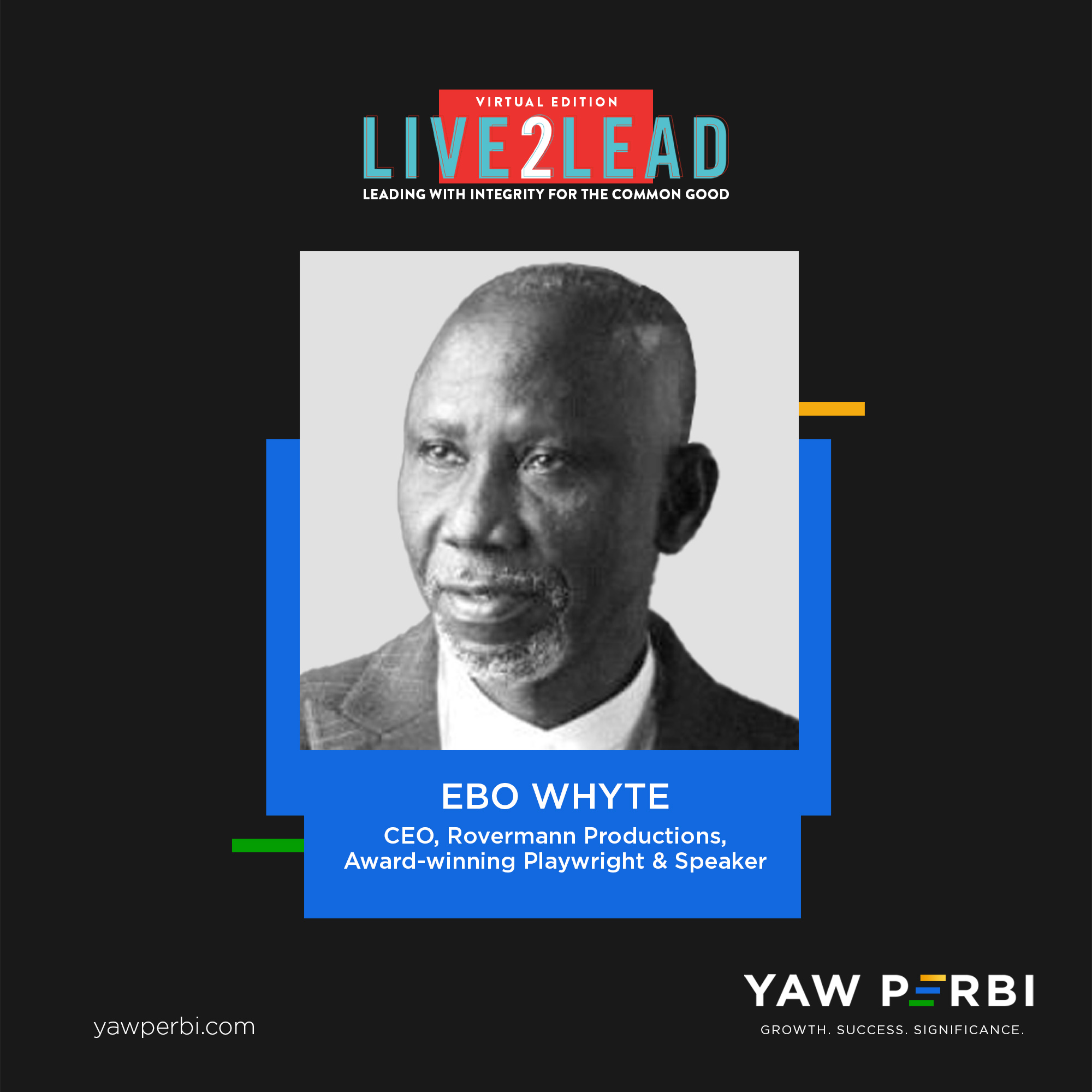
Meet Uncle Ebo, the People’s Uncle.
Everyone calls him “Uncle” without even thinking twice about it. Whether young enough to be their son or old enough to be their grandpa, “Uncle” is everyone’s uncle. A voice of reason, counsel in season, James Ebo Whyte, affectionately known nationwide as “Uncle Ebo” is the people’s uncle, hands down.
Mr. James Ebo Whyte is the CEO, heart and brain behind Roverman Productions. He is nationally acknowledged as an accomplished, award-winning playwright and highly sought-after motivational speaker. James Ebo Whyte constantly challenges Ghanaians to think more about the world they live in and the contribution they make to it. Just the day before the October 7, 2022 Live2Lead conference at which he was speaking, he unveiled to his drama troupe his 51st play in fourteen years! A hearty congratulations to the prolific playwright.
INTEGRITY IN THE ARTS & ENTERTAINMENT INDUSTRY
At Live2Lead 2022, Uncle Ebo was the only gentleman among three distinguished leading ladies from the corporate and entrepreneurship spaces as well as the public sector. Their first job was to respond to the submissions on “Leading with Integrity for the Common Good” made in the earlier hour by Patrick Awuah, founder and president of Ashesi University. Uncle Ebo held our attention as he raised issues of integrity in the arts & entertainment segment of Ghanaian society that he had with intentionality decided to counter, like giving kickbacks from corporate sponsorship. He uttered with conviction, “there are sponsorships we know we’ll never get for our plays because of this.” And he’s fine with it, as he knows that integrity comes at a cost.
One of the most amazing feats of Roverman Productions has been putting up a new play every quarter for the last decade-and-a-half and resolving to always start on time, also a matter of integrity. In fact, one of the participants at Live2Lead, a corporate governance expert, interjected that one reason she chooses to go and see Ebo Whyte’s plays is that she can guarantee they would commence on time. Again, Roverman has gone against the tide by ensuring pristine toilet facilities at their play venues and three levels of security at events to ensure patrons have a heavenly experience and leave with no bitter taste in their mouths. To the people’s uncle, excellence in these areas is a matter of integrity.
OF TEENAGE FOLLY AND GAMBLING
We intentionally wanted to leave the Live2Lead conferees on a note of hope, especially hope in Ghana, and Uncle Ebo did not disappoint. While admitting we have mega challenges in the nation he reminds us that we’ve not only been in worse times but also that in the annals of nation building globally, at 60 years Ghana is only a teenager. The national happenings that leave us in consternation are akin to teenage tantrums and this too shall pass. We do have quite a degree of national folly though, which we need to be cured of, he confesses.
Uncle Ebo’s belief in Ghana is so solid that his parting words were the following: “Whoever bets against Ghana will lose.” For a full buffet of this scintillating conversation look out for a recording of the hitherto livestreamed video (currently only available to paid participants) or invite Live2Lead to rebroadcast in your context (company, community, church etc). You don’t want to miss Live2Lead 2023 on October 6, next year, Deo volonte. Pinned on the first Friday of each October, National Leader Day after National Leader Day, building a leader at a time and one centre of excellence at a time, we shall surely get to the Ghana we want. And who knows? Perhaps sooner than other nations have.

